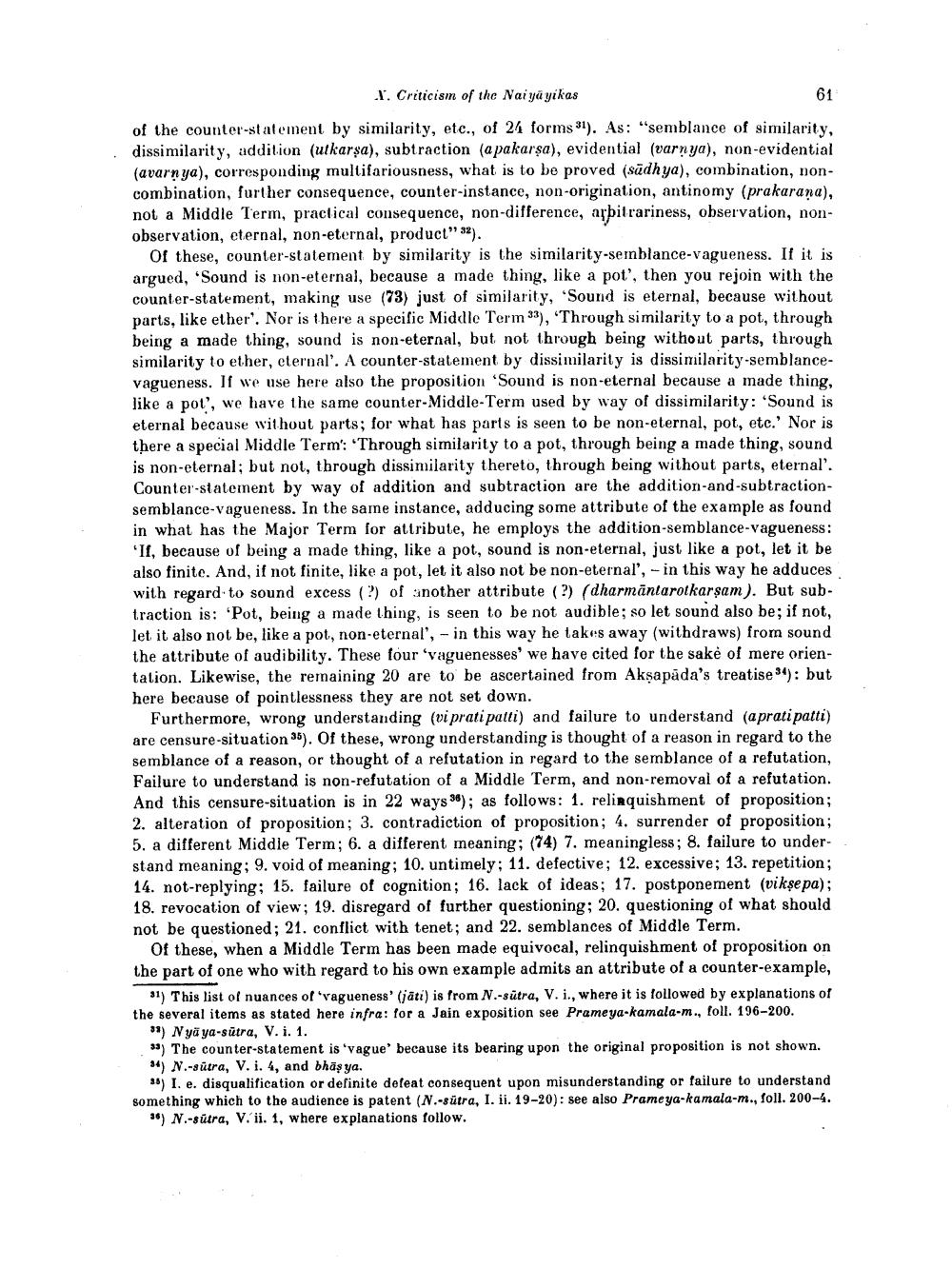________________
1. Criticism of the Nai yayikas
of the counter-statement by similarity, etc., of 24 forms 3). As: "semblance of similarity, dissimilarity, addition (utkarsa), subtraction (apakarşa), evidential (varnya), non-evidential (avarnya), corresponding multifariousness, what is to be proved (sādhya), combination, noncombination, further consequence, counter-instance, non-origination, antinomy (prakarana), not a Middle Term, practical consequence, non-difference, arbitrariness, observation, nonobservation, eternal, non-eternal, product" s2).
Of these, counter-statement by similarity is the similarity-serblance-vagueness. If it is argued, 'Sound is non-eternal, because a made thing, like a pot', then you rejoin with the counter-statement, making use (73) just of similarity, 'Sound is eternal, because without parts, like ether'. Nor is there a specific Middle Term 33), 'Through similarity to a pot, through being a made thing, sound is non-eternal, but not through being without parts, through similarity to ether, eternal'. A counter-statement by dissimilarity is dissimilarity-semblancevagueness. If we use here also the proposition 'Sound is non-eternal because a made thing, like a pot', we have the same counter-Middle-Term used by way of dissimilarity: 'Sound is eternal because without parts; for what has parts is seen to be non-eternal, pot, etc.' Nor is there a special Middle Term: Through similarity to a pot, through being a made thing, sound is non-eternal; but not, through dissimilarity thereto, through being without parts, eternal'. Counter-statement by way of addition and subtraction are the addition-and-subtractionsemblance-vagueness. In the same instance, adducing some attribute of the example as found in what has the Major Term for attribute, he employs the addition-semblance-vagueness: "I1, because of being a made thing, like a pot, sound is non-eternal, just like a pot, let it be also finite. And, if not finite, like a pot, let it also not be non-eternal', - in this way he adduces with regard to sound excess (?) of another attribute (?) (dharmantarotkarşam). But subtraction is: 'Pot, being a made thing, is seen to be not audible; so let sound also be; if not, let it also not be, like a pot, non-eternal', - in this way he takes away (withdraws) from sound the attribute of audibility. These four 'vaguenesses' we have cited for the sake of mere orientation. Likewise, the remaining 20 are to be ascertained from Aksapada's treatise): but here because of pointlessness they are not set down.
Furthermore, wrong understanding (vi prati patti) and failure to understand (a prati patti) are censure-situation"). Of these, wrong understanding is thought of a reason in regard to the semblance of a reason, or thought of a refutation in regard to the semblance of a refutation, Failure to understand is non-refutation of a Middle Term, and non-removal of a refutation. And this censure-situation is in 22 ways 38); as follows: 1. relinquishment of proposition; 2. alteration of proposition; 3. contradiction of proposition; 4. surrender of proposition; 5. a different Middle Term; 6. a different meaning; (74) 7. meaningless; 8. failure to understand meaning: 9. void of meaning; 10. untimely; 11. defective; 12. excessive; 13. repetition; 14. not-replying; 15. failure of cognition; 16. lack of ideas; 17. postponement (vikse pa); 18. revocation of view; 19. disregard of further questioning; 20. questioning of what should not be questioned; 21. conflict with tenet; and 22. semblances of Middle Term.
Of these, when a Middle Term has been made equivocal, relinquishment of proposition on the part of one who with regard to his own example admits an attribute of a counter-example,
31) This list of nuances of vagueness' (jäti) is from N.-sutra, V. i., where it is followed by explanations of the several items as stated here infra: for a Jain exposition see Prameya-kamala-m., foll. 196-200.
»*) Nya ya-sútra, V. i. 1. *) The counter-statement is 'vague' because its bearing upon the original proposition is not shown. *) N.-sútra, V. i. 4, and bhāş ya.
35) I. e. disqualification or definite defeat consequent upon misunderstanding or failure to understand something which to the audience is patent (N.-sütra, I. ii. 19-20): see also Prameya-kamala-m., foll. 200-4.
*) N.-sutra, V. ii. 1, where explanations follow.




